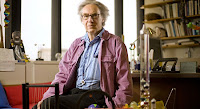This article from the International Herald Tribune made me laugh out loud today. It tells of a charming and theatrical physics professor from MIT, whose internet-broadcast lectures are proving quite a hit. He is known for bouncing around the lecture theatre, performing dramatic experiments with props and generally making physics fun. When Walter H G Lewin gained a cult following at MIT, the institute created a global classroom using its OpenCourseWare - and now anyone in the world can log on and benefit from his knowledge and enthusiasm for FREE. And they do. Apparently, Prof Lewin has received fan mail from India, China, Iraq and many other places, and he was No 1 in the download charts on IPhoneU for a while. It's a fantastic example of someone with a gift for teaching thinking of new ways to reach out and touch their students, wherever they may be.
Well, guess where I'm off to next? Yes, to an online science lecture - I want to witness Prof Lewin for myself and develop my own love of physics. If anyone can help me do that - something of an upward climb - then I guess Prof Lewin may be the man. (Photo from IHT online.)
(Photo from IHT online.)
(Actually, you can link to the lectures from a little box to the side of the IHT article. I've already had a peek. All 36 lectures are there so you can view them in order, or pick a subject that takes your fancy. The high res versions are more or less like being in the lecture hall yourself... though you are less likely to be hit by any flying props. Each is 45 mins, so this is something to do when you have some time, and a cup of tea in your hand...)
Wednesday, December 19, 2007
Day Sixty-Nine: sharing knowledge and a little love
Posted by
eazibee
at
3:33 PM
![]()
![]()
Subscribe to:
Post Comments (Atom)




















3 comments:
This sounds great - but sampling his thatrical bouncing will have to wait for Christmas relaxing. The most exciting bit of my own school science experience was cutting up frogs.
There are wonderful science lectures for kids these days, a recent one on sound for 7 to 14 year-olds at the Royal Albert Hall included the biggest whoopee cushion in the world (verified by the Guiness Book of Records) and a barber’s shop quartet transformed by technology into a rock band.
That's the way to do it.
You should check out your local University or college. I did a course of evening lectures in the UK a couple of years ago, which talked through physics (specifically quantum physics) in an easy to understand manner. I only went to see if it would ever be possible to "transport" yourself Star Trek styleee (no, unfortunately), but it was incredibly interesting (and this from an English and Arts girl).
Well, Milli, I am impressed - even if 'beaming up' isn't possible... were those lectures free too then?
Actually, another RTBH reader, Titus, sent me some info last night in response to this post, about Yale openware - you can digest lectures from courses in astronomy, English lit, philosophy, religion, physics, psychology and political science, all at: http://open.yale.edu/courses/
... and, again, all for free.
The possibilities for open access knowledge/learning really are exciting. Now what is needed of course is much greater access to the internet - I read recently that only around 3% of the global population has access to the internet in their home (this seems very low, actually - there must be at least some more people that have access through other routes, including internet cafes). If the internet is going to continue as the medium of choice for sharing knowledge, then we need to enable people to access it cheaply through their mobile phones (which are really taking off in many developing countries) or through low-cost computers (see Day Twenty of this blog).
I actually don't think this is unfeasible. There seems to be something of a battle going on between the tech giants - and some smaller fry, like One Laptop Per Child - over who should develop the infrastructure and how, not whether it happens at all. That means they feel there is a market worth fighting over. So the technology will come - it's the access for the poorest that will need to be enabled...
E
Post a Comment